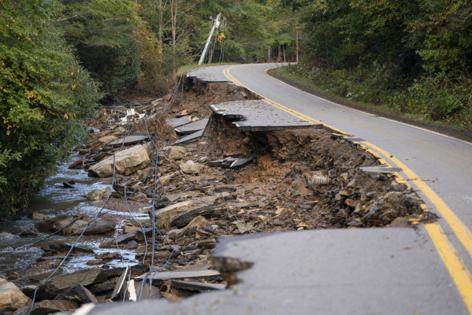North Carolina lawmakers weigh state aid as officials warn of delays in federal Helene recovery funds
Published in News & Features
North Carolina lawmakers opened the business of the 2025 legislative session Wednesday with a hearing on Hurricane Helene recovery efforts, attempting to sort out how much state funding is necessary and raising concerns over the disbursement of federal aid.
Testifying before the House committee on Helene recovery, Mark Calabria, director of the Governor’s Recovery Office for Western North Carolina, and Jonathan Krebs, Western North Carolina recovery adviser, outlined recovery efforts and funding. Gov. Josh Stein, in early January, created GROW NC to focus on the hurricane-ravaged part of the state.
According to the Office of State Budget and Management, damages and needs in Western North Carolina are estimated at just under $60 billion.
In December, Congress approved a $100 billion disaster relief package, with a portion allocated to North Carolina.
State lawmakers have also allocated about $900 million toward recovery efforts across three relief bills. They’re expected to allocate more.
Calabria and Krebs said the state estimates it will receive $15.7 billion in federal money, including, according to a presentation they shared:
—$3.2 billion from the Federal Highway Administration Emergency Relief program (DOT)
—$1.65 billion from Community Development Block Grant-Disaster Recovery (HUD)
—$6.9 billion from the Federal Emergency Management Agency’s Disaster Relief Fund
—$250 million in disaster loans from the Small Business Administration (SBA)
—$3.7 billion from additional sources, such as the U.S. Department of Agriculture and Environmental Protection Agency
However, that money is nowhere near enough to meet the state’s needs, they said — and much of it remains inaccessible.
Krebs outlined top priorities for recovery.
“As we talk about critical areas moving forward, our priority focus, number one, is debris removal. We have to get it out of our communities as quickly as possible,” Krebs said.
“Next is housing. We’ve got to start moving on housing, but I have concerns that based on the (presidential) transition” that those dollars “will be delayed in D.C. for a variety of reasons. Those delays could put us at risk of not being able to immediately start housing until the fall,” he said.
“If we are going to build this summer and start the work on permanent housing and make the best of 2025, we’re going to have to come up with some creative solutions,” Krebs said.
Asked about other funds currently available, Krebs said Wednesday that FEMA funds were “reactivated today” following a federal pause on all grants a day earlier.
The state is “actively spending and reimbursing (those funds) in real time every day throughout the emergency,” he said. Some other funds, such as for road repairs, are also flowing, he said.
But funds meant for the U.S. Department of Housing and Urban Development (HUD) remain inaccessible. “I talked to them today. HUD does not have access to HUD funds,” Krebs said. He explained that the funds have not yet been transferred, which “typically would have been done after an appropriation is made.”
Because of this, “we are in need of some spending authority here very soon,” Krebs said.
The state will need to “wait for the feds to give it to us, or we can take action, because you direct us.”
Republican Rep. Mark Pless, who represents Haywood and Madison counties, said he is wary of state spending in anticipation of federal reimbursement.
“I don’t want us in a situation where we’re spending somebody else’s money under the pretense that they’re going to give it back to us,” Pless said.
The federal money “sounds great, but it does nothing to put my people back where they need to be,” he said.
When President Donald Trump visited Western North Carolina this month, Stein requested an extension of the 100% federal cost-share period for FEMA funding by six months and also urged the inclusion of a robust aid package for Western North Carolina in any federal funding bill addressing California wildfires, according to Calabria and Krebs.
Additionally, Stein called on Congress to make private roads and bridges eligible for FEMA funding.
_____
©2025 The Charlotte Observer. Visit charlotteobserver.com. Distributed by Tribune Content Agency, LLC.







Comments